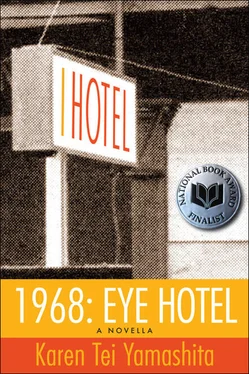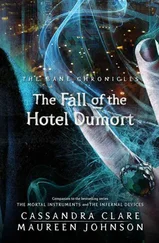Now it’s the ceremony: three incense sticks per person, three bows per person.
Paul does his thing obediently, but turning from the altar, he sees Chen coming forward with three sticks of incense.
Chen greets Auntie and smiles at Paul. She says, “Maybe you are interested in my brother’s books. Talk to my nephew and make a visit to the house.”
Chen rakes his fingers through his hair and says to Paul, “Have you walked to the other side of the cemetery?” He motions to Auntie. “Don’t worry. I’ll drive Paul home.”
Auntie’s wraps up the food offerings. “Look, you take this home for your dinner.” She hands Paul a hefty shopping bag.
Paul follows Chen, crisscrossing the tombstones carved with Chinese characters. He points at the names and notes the oldest families, the earliest dates. “No paper names used here. When you die, you use your real name. Too late for immigration to deport you.”
Paul nods, but he knows his name’s not paper. It’s the real thing. His father’s story is different.
“I introduced your mother to your father,” Chen says casually. “She was very beautiful, much younger, my age. Twenty years difference, but it didn’t matter. At first they met with their brains. She fell in love with his mind. Well, there was more of course, since you didn’t pop out of their brains. You were born right away.”
“How did you know my father?”
“He was a friend of my family in Paris, but I wasn’t even born. He came to Paris to paint around 1920. He hung around Chou En-lai and the others at the Pascal Restaurant, on the Rue de l’Ecole de Medicine.” Chen speaks the last words in French. “He helped Chou stage a protest of the Chinese Legation, traveled around Europe with Chou to get recruits for the Chinese Communist Youth Corps.”
Paul is hearing this for the first time. “Chou?” he asks.
“Yes, China’s premier. The same.”
“He never said.”
“They parted ways. Chou returned to China to fight with Sun Yat Sen. Your father came home. What he really wanted was to return to his painting, and his family was here. His father died suddenly. Your auntie was a young girl, and he was the only son. He was a Marxist, but also filial.”
Paul is quiet. He isn’t a Marxist, but he already knows it’s going to be impossible to be filial.
“I looked him up when I came to study. He remembered my family from those days in Paris. When I met him, he was living and painting in the Monkey Block.”
“Monkey Block?”
“That’s what they called the block on Montgomery at Washington. The street was a hangout for artists and writers. The building was full of artist studios. Used to be the Black Cat Café in the basement.”
Paul follows Chen. Chen’s a stroller, reading the stones and throwing out anecdotes. Paul’s trying to grab his past as Chen tosses it over his shoulders. “Let’s take that pig’s head and head on home,” Chen says. “I’m famished.”
Paul thinks famished is an interesting word.
Back at the house, Chen clears off the kitchen table, washes the dishes, rummages around the drawers and finds a tablecloth that hasn’t been used since Paul’s mother was alive. He spreads that out, boils water for tea, sets the table. Paul’s not famished, he’s starving, but Chen’s got to have a pot of rice too. Far as Paul knows, it’s high dining. Chen fills glasses with foaming beer and toasts. “Now,” he says, settling in with the food and steaming rice, “eat slowly. Think about your father. And Martin Luther King.” He shakes his head. “I teach at San Francisco State. I cancelled my classes today. A great loss.”
Paul sips at the foam across his glass of beer. Acid bubbles singe his senses. Suddenly it occurs to him. He could get stupidly wasted, like every other high school kid with that opportunity. Chen seems oblivious, cutting into the pig’s head, relishing every bite. It’s an empty freedom.
Next day, he doesn’t know why, but he starts to clean his dad’s house like he’s looking for something. Those paintings in the corners. Dust, sweep, polish, wipe, classify. It’s like he’s one of Auntie’s kids, commandeered to tidy up the gravesite. All summer he’s into it. Auntie comes round to see what he’s up to. She’s pleased, but he doesn’t stop. The dark grain of the wood floors and paneling is shining back at her. Smells like Pledge. “Is this healthy?” she asks timidly. She’s looking at her brother’s old paintings. Kid’s got them hanging on the walls. “Are you having a psychological crisis? You should enjoy the summer with your friends. It’s not normal to be alone inside this old house.”
“I’m fine, Auntie.” He’s distracted. On the television, Walter’s talking about Chicago. Police clubbing and gassing protestors at the Democratic Convention.
End of summer he knows the house, every shelf, every drawer, every corner, everything. House is immaculate. Day after Labor Day he steps out, locks the door. Heads off to SFSC. Got to see Chen to find the real keys to get back in.
Chen’s got a class in contemporary Chinese literature. He lectures without notes. It’s all in his head. This cat’s amazing. Quotes passages. Talks dates, anecdotes. Like he knows the authors. Maybe he does. Paul goes home and finds the books. It’s all there in his library, in Chinese and in translation. His dad’s scribbling’s in the margins, but it’s mostly in Chinese. Paul’s got to use a dictionary to decipher it, or ask Chen. Chen says, “You know Yat Min Lee? Calls himself Edmund. He sits in the back. I’ll introduce you. He can read it all for you. And in return, you can lend him the books. He doesn’t have the money to buy them.”
Turns out Edmund is the smartest kid in class. Reads everything in the original Chinese, criticizes the translations. Paul tries to be friendly, but Edmund’s too busy. He comes around when he can, hangs out in Paul’s library, but he’s got a job busing tables at Fisherman’s Wharf. That’s his routine. Got to make money to keep from taking it from his family’s table. Family’s loud and noisy, crowded into two rooms above a laundry. His business is everybody’s. As for Paul, his dad always had rent money coming in from his properties. Now Paul’s got to do the accounting every month. Two boys wishing they had the other’s problems.
Today Chen’s on to Lu Hsun. “Mao Tse-Tung has said that Lu Hsun is his favorite writer.” Everyone perks up at this. Mao, he’s the man. Lu Hsun’s got to be our favorite too. Chen goes on to give the details. Lu Hsun was studying medicine in Japan when he saw these imperialist war slides of Japanese soldiers chopping off the head of a Chinese spy. What disgusted him were the bored Chinese in the pictures who were forced to see the spectacle. That’s it. Lu Hsun gives up medicine. What’s the point? He could study all he wanted to make his people healthy in body, but they were sick in their minds, dig. Now this might seem like a jump, but Lu Hsun thinks the answer is literature. So he starts a new life writing.
Chen pulls it out of his head: Lu Hsun’s preface to his collection of short stories. He’s got a photographic memory, but if you want to check, you can follow along in the book: “When I was young, I, too, had many dreams. Most of them came to be forgotten, but I see nothing in this to regret. For although recalling the past may make you happy, it may sometimes also make you lonely, and there is no point in clinging in spirit to lonely bygone days. However, my trouble is that I cannot forget completely, and these stories have resulted from what I have been unable to erase from my memory.” Chen’s voice trails off like he’s forgotten what he’s on to, but Paul knows he’s talking to him. Why is the call to write so strong? Only a writer knows. You can give any excuse you want.
Читать дальше












